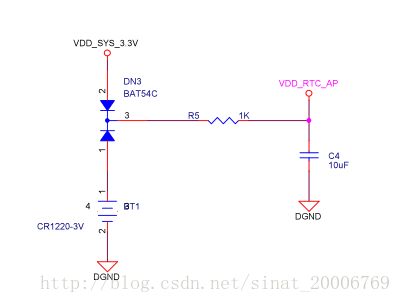【TINY4412】LINUX移植笔记:(25)设备树RTC驱动
【TINY4412】LINUX移植笔记:(25)设备树 RTC驱动
宿主机 : 虚拟机 Ubuntu 16.04 LTS / X64
目标板[底板]: Tiny4412SDK - 1506
目标板[核心板]: Tiny4412 - 1412
LINUX内核: 4.12.0
交叉编译器: arm-none-linux-gnueabi-gcc(gcc version 4.8.3 20140320)
日期: 2017-9-9 09:34:48
作者: SY
简介
RTC 时钟在电脑主板上,开发板上随处可见,在主机断电后,如果没有后备电池供电,那么系统时间将会丢失,因此一般的主板上都会配置一个 cr1220 的纽扣电池。
这是开发板的 RTC 供电设计,如果开发板上电,后备电池不会输出电流,因为没有压降。当开发板断电,后备电池供电,维持 RTC 中的时间。
移植
设备树
&rtc {
status = "okay";
};驱动文件
打开 driver/rtc/rtc-s3c.c
static struct s3c_rtc_data const s3c6410_rtc_data = {
.max_user_freq = 32768,
.needs_src_clk = false,
.irq_handler = s3c6410_rtc_irq,
.set_freq = s3c6410_rtc_setfreq,
.enable_tick = s3c6410_rtc_enable_tick,
.save_tick_cnt = s3c6410_rtc_save_tick_cnt,
.restore_tick_cnt = s3c6410_rtc_restore_tick_cnt,
.enable = s3c24xx_rtc_enable,
.disable = s3c6410_rtc_disable,
};将 .needs_src_clk = true, 改为 .needs_src_clk = false, 否则在执行
if (info->data->needs_src_clk) {
info->rtc_src_clk = devm_clk_get(&pdev->dev, "rtc_src");
if (IS_ERR(info->rtc_src_clk)) {
ret = PTR_ERR(info->rtc_src_clk);
if (ret != -EPROBE_DEFER)
dev_err(&pdev->dev,
"failed to find rtc source clock\n");
else
dev_dbg(&pdev->dev,
"probe deferred due to missing rtc src clk\n");
clk_disable_unprepare(info->rtc_clk);
return ret;
}
clk_prepare_enable(info->rtc_src_clk);
}报错。
menuconfig
Device Drivers --->
[*] Real Time Clock --->
<*> Samsung S3C series SoC RTC 烧录
[ 3.932861] s3c-rtc 10070000.rtc: rtc disabled, re-enabling
[ 3.938078] s3c-rtc 10070000.rtc: warning: invalid RTC value so initializing it
[ 3.945378] rtc rtc0: invalid alarm value: 1900-1-2 0:0:0
[ 3.950841] s3c-rtc 10070000.rtc: rtc core: registered s3c as rtc0
[ 4.109938] s3c-rtc 10070000.rtc: setting system clock to 2000-01-01 00:00:38 UTC (946684838)查看设备节点
[root@TINY4412:~]# ls /dev/rtc0
/dev/rtc0APP
/*
* rtc driver for tiny4412
*
* Copyright (c) 2017
* Author: SY <[email protected]>
*
* This program is free software; you can redistribute it and/or
* modify it under the terms of the GNU General Public License as
* published by the Free Software Foundation; either version 2 of
* the License, or (at your option) any later version.
*
*/
#include
#include 测试
[root@TINY4412:~]# ./tmp/rtc r
> 2000-00-01 00:02:47
[root@TINY4412:~]# ./tmp/rtc w 2017 9 9 12 53 10
[root@TINY4412:~]# ./tmp/rtc r
> 2017-09-09 12:53:12或者直接通过 Linux 命令设置时钟。
设置 Linux 时钟:
[root@TINY4412:~]# date -s "2017-09-09 13:03:01"
Sat Sep 9 13:03:01 UTC 2017设置硬件时钟:
[root@TINY4412:~]# hwclock -w
[root@TINY4412:~]# hwclock
Sat Sep 9 13:03:11 2017 0.000000 seconds[root@TINY4412:~]# hwclock -h
hwclock: invalid option -- 'h'
BusyBox v1.27.0 (2017-08-05 19:36:54 CST) multi-call binary.
Usage: hwclock [-r|--show] [-s|--hctosys] [-w|--systohc] [-t|--systz] [-l|--localtime] [-u|--utc] [-f|--rtc FILE]
Query and set hardware clock (RTC)
-r Show hardware clock time
-s Set system time from hardware clock
-w Set hardware clock from system time
-t Set in-kernel timezone, correct system time
if hardware clock is in local time
-u Assume hardware clock is kept in UTC
-l Assume hardware clock is kept in local time
-f FILE Use specified device (e.g. /dev/rtc2)现在遇到的问题是,只要不掉电,读写 RTC 时间都是正常的,但是关机等待 1min 后重启,时间就丢失了!电池放在这里 1 年左右,应该会有电。以后再来解决这个问题。
参考
设备树学习之(六)RTC
